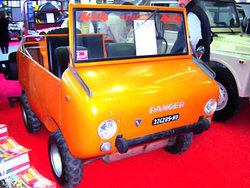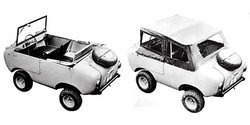Difference between revisions of "Ferves"
m |
m |
||
| Line 16: | Line 16: | ||
== Characteristics == | == Characteristics == | ||
| − | |||
Coach discovery to four seats, with a specific frame sections of steel rectangular section, which are set riveted panels that form the compact body in steel plate. The windshield is adjustable forward as the classic Jeep and could be ordered with the optional allocation of a hood on canvas, supported by ribs which can be dismantled. | Coach discovery to four seats, with a specific frame sections of steel rectangular section, which are set riveted panels that form the compact body in steel plate. The windshield is adjustable forward as the classic Jeep and could be ordered with the optional allocation of a hood on canvas, supported by ribs which can be dismantled. | ||
| − | Built on a Fiat, suspensions and brakes off a | + | Built on a [[Fiat]], it had the suspensions and brakes off a [[Fiat 600]]D, earlier off the [[Autobianchi Primula]], while the engine and steering were derived from the [[Fiat 500]]F. |
| − | + | The Ferrari, the same as the Samas Yeti, was a 4x4 version for use in construction and agriculture. | |
[[Image:ferves_ranger_4x2.jpg|thumb|right|250px|'''Ferves Ranger 4x2''']] | [[Image:ferves_ranger_4x2.jpg|thumb|right|250px|'''Ferves Ranger 4x2''']] | ||
| − | The engine, rear | + | The engine, located in the rear, a inline cylinder air-cooled with an engine capacity of 499.5 cc, with side positioned camshaft. The power, unchanged compared to the [[Fiat]] engine, had 18 hp at 3,000 rpm. |
| − | The rear traction | + | The rear traction, in the case of "Ranger 4X2", was an integral. In the "Ranger 4X4" model, introduced in 1968, the four wheel drive was manually engaged. Both models had the exchange, to four marches plug quickly, plus a first reduced and the manually locking rear differential. |
| − | The brakes | + | The brakes were drums, with independent handbrake on the rear wheels that operated mechanically. They had an [[independent suspension]] with helical springs connected to triangular arms, for those earlier and oblique rear 165-12 tires. |
| − | The four-wheel drive differs from "4x2" | + | The four-wheel drive differs from "4x2" with a wheelbase increased to 1.55 m and a total length increased to 2.83 m. |
| − | The maximum speed | + | The maximum speed was only 70-80 km/h. |
| − | The "Ranger" was also produced in a version | + | The "Ranger" was also produced in a work version, called the "Cargo", with a useful load capability up to 300 kg. |
Revision as of 11:34, 20 July 2009
The Ferves was an Italian automobile manufactured from 1965 until 1970. Based on the Fiat, it was a multi-purpose car powered by a rear-mounted 499 cc two-cylinder in-line engine.
Fiat 500 Ferves Ranger

The Ferves Ranger was a small all off-road car, produced by the body builder Ferves of Turin from 1966 to 1971.
It was first presented at the Exhibition of Industry in Turin, 1966, as a vehicle for leisure and for work, named the "normal" and the "Cargo".
Characteristics
Coach discovery to four seats, with a specific frame sections of steel rectangular section, which are set riveted panels that form the compact body in steel plate. The windshield is adjustable forward as the classic Jeep and could be ordered with the optional allocation of a hood on canvas, supported by ribs which can be dismantled.
Built on a Fiat, it had the suspensions and brakes off a Fiat 600D, earlier off the Autobianchi Primula, while the engine and steering were derived from the Fiat 500F.
The Ferrari, the same as the Samas Yeti, was a 4x4 version for use in construction and agriculture.
The engine, located in the rear, a inline cylinder air-cooled with an engine capacity of 499.5 cc, with side positioned camshaft. The power, unchanged compared to the Fiat engine, had 18 hp at 3,000 rpm.
The rear traction, in the case of "Ranger 4X2", was an integral. In the "Ranger 4X4" model, introduced in 1968, the four wheel drive was manually engaged. Both models had the exchange, to four marches plug quickly, plus a first reduced and the manually locking rear differential.
The brakes were drums, with independent handbrake on the rear wheels that operated mechanically. They had an independent suspension with helical springs connected to triangular arms, for those earlier and oblique rear 165-12 tires.
The four-wheel drive differs from "4x2" with a wheelbase increased to 1.55 m and a total length increased to 2.83 m.
The maximum speed was only 70-80 km/h.
The "Ranger" was also produced in a work version, called the "Cargo", with a useful load capability up to 300 kg.
References
David Burgess Wise, The New Illustrated Encyclopedia of Automobiles.
| Car Information and Photos by Marque: A - B - C - D - E - F - G - H - I - J - K - L - M - N - O - P - Q - R - S - T - U - V - W - X - Y - Z |
| Motorcycle Information and Photos by Marque: A - B - C - D - E - F - G - H - I - J - K - L - M - N - O - P - Q - R - S - T - U - V - W - X - Y - Z |

